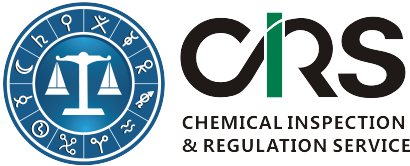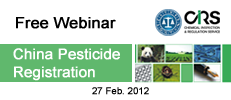The Future of Export-only Pesticides Registration in China?
At the end of 2013, registration for export-only pesticides was suspended by ICAMA (The Institute for the Control of Agrochemicals of the Ministry of Agriculture) in China. The changes were somewhat expected as ICAMA continues to revise and update its pesticide registration system. Mr David Wan, the head of pesticide and biocides team in CIRS China, explains the background of suspension and shares his views about the future of export-only pesticide registrations.
At the end of 2013 until present, registration for export-only pesticides was suspended by ICAMA (The Institute for the Control of Agrochemicals of the Ministry of Agriculture). The changes were somewhat expected as ICAMA continues to revise and update its pesticide registration system. The draft version of new pesticide regulation has been issued for public comments since 2011, and the final version has not yet been published. The administrative measures on registration for export-only pesticides were also included in this draft version. Now, it is a very critical time for internal discussion within ICAMA, where careful decisions for this draft version are being made.
At present, although new applications have been suspended, previous registrants can still export their pesticide products. This suspending event only affects the companies, who intent to apply for the certificate for export-only pesticide. However, we should recognize it is a considerable blow for these companies.
How We Got Here
In accordance with the Regulation on Pesticide Administration (RPA) issued by The State Council in May 1997 and amended in November 2001, pesticide products are required to be registered with ICAMA and are also required to obtain a China Pesticide Certificate prior to any manufacturing in China and importing into China.In the case where a company intends to export its pesticide products outside of China, they are required to apply for a permit for the import and export of pesticides from ICAMA for every shipment. Application for this permit requires a China Pesticide Certificate, which means the pesticide product has been registered in China, and this permit must be provided to China Customs for customs clearance.
Generally speaking, companies can obtain the China Pesticide Certificate by carrying out a pesticide temporary registration and/or pesticide full registration. Only after obtaining the China pesticide certificate can the pesticide products be legally manufactured, marketed domestically, or be imported and exported.
However, there are still special registration procedures for export-only pesticide products. If the pesticide products are only manufactured for exporting purpose and will not be marketed domestically, then manufacturers could go through these special registration procedures to obtain the certificate for export-only pesticide. The special registration policies in different timeframes have their own features. In the era from 1999 to 2006, companies could proceed with CHD notification, namely notification for export-only pesticide. Then from 2007 to 2013, companies were permitted to proceed with registration for export-only pesticide to obtain the certificate. Since the end of 2013, the special registration procedure for export-only pesticide products is suspended.
CHD Period, 1999-2006
During this period, many Chinese manufacturers produced pesticide products only for export purposes. For the purpose of encouraging Chinese manufacturers to export their product quickly and conveniently, ICAMA allowed these companies to go through CHD pesticide notification to obtain the permit to export their pesticides out of China.The CHD notification requires little data and study. The cost and application duration could be ignored compared with those of temporary and full pesticide registrations. An great many companies had applied for CHD notification during this period and this policy does promote the pesticide exports of China.
However, this policy caused malignant competition both in international market and domestic market. With CHD notification, these companies could provide the same pesticide products with very low cost, as it is not necessary for them to spend a great deal of money on tests and studies, which are always required for temporary and full registrations. This is the reason many Chinese pesticide anti-dumping cases surfaced during this period.
Eventually, this CHD policy was removed by ICAMA by the end of 2006. In consideration of exporting requirements and development of the Chinese pesticide industry, a new policy, namely administrative measures on registration for export-only pesticide, was published by ICAMA in 2007. Since then and as a result, China entered the second iteration of its regulatory policy on exports.
Registration for Export-only Pesticides, 2007-2013
Since 2007, the administrative measures on registration for export-only pesticide has always been a draft version, also called a trial version. In accordance with this regulation, the precondition of this type of registration was that these products must have been registered in target countries.However, as a matter of fact, the requirement on overseas registration certificate was antimony on some occasions. In some counties, the Chinese pesticide certificate is required as precondition for pesticide registration. Companies cannot work forward to get their product registered either in China or target countries. But for some developed countries, this is no longer a problem. These countries do not require origin pesticide certificate (certificate of free sale) and they have developed registration system.
Although it is not quite as easy for some companies that can get their product notified very quickly under CHD policy, there were still lots of products that received the certificate for export-only pesticide. For every 10 pesticide certificates issued for new pesticide in 2013, six certificates were issued for export-only pesticide. Meanwhile, 10 certificates were issued for export-only pesticides during January 2014, including new pesticide and “me-too” pesticide.
Looking into the data requirements of the administrative measures, we can find the reason why this policy is so attractive. Only five-batch analysis reports and six-item acute toxicity studies are required for this registration. These studies could be done within six months. Meanwhile, the official review duration is three months rather than one year for full pesticide registration. Generally speaking, companies only need to spend a maximum of nine months and 200,000 RMB ($32,450) to get their product registered.
The Future of Regulation
China’s pesticide industry is concerned about the final version of China Pesticide Regulation because they do not yet contain special provisions for export-only pesticides, which could increase the cost and requirements on efficacy trials and residue studies that have been amended in the draft version.But we suspect that preferential provisions will still be available for export-only pesticide registration. The reasons are:
1. Only 15% of China’s overproduction is consumed in the domestic market.
2. Chinese government is still supporting the country’s pesticide exports and the manufacturers behind them.
3. Referencing the pesticide regulation system of developed counties, it makes sense to set up an appropriate policy for export-only pesticide registration.
4. China’s large pesticide export enterprises will influence ICAMA in a manner to keep their stable marketing outside of China.
5. There is no doubt that the new China Pesticide Regulation will include some sort of beneficial provision for export-only pesticide registrations.
When we analyze and study the historical development of regulations in China, we are starting to see a mature regulation system for export-only pesticides has been generated incrementally. Chinese manufacturers that have registered products during different regulation periods likely will have their certificates grandfathered into the new law or allowed some provisions and maintain their ability to serve the global marketplace.
The article was published in Farm Chemicals International.
http://www.farmchemicalsinternational.com/crop-inputs/how-chinas-export-laws-are-affecting-supply/
About the author
David Wan graduated from Zhejiang University with Master Degree in life science. He has developed many years of consulting experience in chemical regulatory compliance, particularly in areas such as EU REACH Registration, CLP, China GHS, restricted substance control and now China Pesticide Registration.
Contact Us
-
CIRS China
Hangzhou CIRS Co., Ltd. (CIRS China)
11F Building 1, Dongguan Hi-Tech Park, 288 Qiuyi Road, Binjiang District, Hangzhou 310052, China
Tel: +86-571 8720 6555 | Fax: +86-571 8720 6533
Email: Service@cirs-reach.com
To follow more events and free regulatory updates from CIRS, please subscribe our monthly newsletter:

